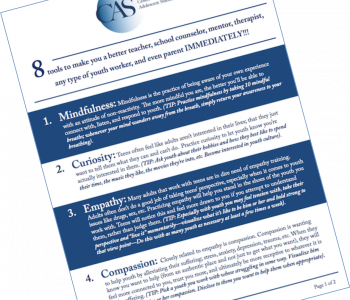

Catharine Hannay, MA
Catharine Hannay is the founder of MindfulTeachers.org and the author of Being You: A Girl’s Guide to Mindfulness, a workbook for teen girls on mindfulness, compassion, and self-acceptance.
How Can I Help Others When I’m Struggling Myself?
I’m sure you’ve already heard many times that you should “put on your own oxygen mask first” or that “you can’t pour from an empty cup.” I don’t think any of us disagree, but there are times when that advice isn’t enough. What if you feel like the well’s run dry, or like there’s no more oxygen left in the tank?
I know it can get really tough attempting to balance your own needs with the needs of those you serve, especially when your working conditions are far from ideal. Here are eight suggestions on ways to ‘refill your oxygen tank’ so you can keep serving others in a sustainable way. I also have several questions for you to consider if you’re feeling like you just can’t do it anymore and it might be time to move on from your current job.
How to Fill (or Stop Draining) Your ‘Oxygen Tank’
- Don’t Spend Too Long in ‘Survival Mode’
During short-term crises, you can get away with unhealthy eating habits and not getting enough sleep or exercise. But when survival mode goes on and on and on, this can have a serious negative effect on your health.
“Food, drink, sleep, and movement are all essential for our survival. And while those habits may have only a minor impact on our daily lives when taken in isolation, what we do and how we live each day adds up quickly, or even exponentially, when you push repeat week after week, month, after month, and year after year […] it can compound over time and end up interfering profoundly with your health and happiness, often without you knowing it.” (Dr. Jennifer Ashton, The Self-Care Solution, p. 3)
- When You’re Feeling Broken, Try Something Wholesome
I’m choosing the word ‘wholesome’ because ‘comforting’ can sometimes be problematic. Having a huge bowl of ice cream or knocking back a few drinks might feel soothing at the time, but will likely leave you with a headache or a bellyache, and could lead to serious health issues if it becomes a regular habit.
Think about what feels wholesome (both comforting and healthy) to you. Eating a bowl of oatmeal? Baking a loaf of bread? Wrapping yourself in a fuzzy blanket? Playing with a small child or cute fuzzy animal? Or perhaps watching your favorite Muppet videos? For me, that’s Colbie Caillat and Common singing “Belly Breathe” with Elmo on Sesame Street. And Harry Belafonte singing “Earth Song: Turn the World Around” on the Muppet Show. I especially like the ending, with the usually-snarky guys from the balcony sweetly singing along.
- Don’t Drown the Cactus or Water the Goldfish
You don’t need to give equal amounts of ‘water’ (your time and energy and attention) to all of the ‘plants’ (those you serve in your work, and anybody else in your life). After all, a fern needs significantly more water than a cactus does.
On a related note, you’ve probably heard the expression, “to a hammer, everything looks like a nail.” I think there’s a similar phenomenon—to a helper, everyone looks like a helpee. Or, to put this another way, you can get so caught up in ‘watering plants’ that everything starts looking like a plant—there are situations that are already going fine and it’s better to save your ‘water’ for where it’s really needed.
- Stop Ruminating
As Seth Godin points out, “No one ever says, ‘I’m glad I spent hours turning this situation over in my mind last night, because it prepared me for today’s meeting.” (Linchpin, p. 178)
Reflecting, yes. Strategizing, yes. Thoughtfully considering your options, certainly. But it’s not at all helpful to keep going around and around in endless loops with the same thoughts about the same situation.
When you catch yourself in a thought loop, do a quick reset by deliberately redirecting your attention to something else. Sometimes I’ll tell myself “Reset” or “Time for a reset.” At other moments, I’ll use different phrasing, like “That’s enough for today” or “I’ve done as much as I can” or “Time to move on.”
You could also try counting your breath. Or counting your blessings. Or counting the ceiling tiles. Count just about anything, as long as it has pleasant or neutral connotations for you.
Or you could try listing things in alphabetical order. Names of countries, names of cities, names of animals (U is for Umbrellabird… X is for Xerus…)
Any of these options should provide just enough mental activity to redirect your attention away from what’s worrying you.
- Don’t Take Everyone Home with You
Many helpers have a tendency to keep thinking about and worrying about their helpers 24/7. I remember one particularly stressful semester when I would toss and turn for hours, and when I finally did fall asleep, I’d dream about my students!
A therapist told me her husband keeps teasing her that she should buy a bus—that way she can physically bring all her clients home to spend the weekend with her family, since that’s where all her attention goes anyway.
- Solvitur Ambulando (“It is solved by walking.”)
College instructor Dinty W. Moore finds walking to work helps him reduce stress and focus on his priorities.
“It takes me forty-five minutes, which can be tiring at times, but the more I do it the quicker the time goes by. For a while, I had an argument running in my head: You could get more work done […] if you didn’t spend ninety minutes walking to and from campus. But then I realized I did get more work done on the days that I walked, because I was sharper, clearer, had used some of the foot-time to sort the detritus from my brain and identify the daily to-do list that actually mattered.”
(‘Of Idle People Who Rove About’ in Crafting the Personal Essay)
- Say It Out Loud
Depending on the dynamics at your workplace, it might or might not be a good idea to vent with coworkers behind the scenes. Sometimes this is helpful; at other times it can turn into griping sessions that don’t solve anything and leave everyone feeling even more tired and irritable.
You should also be cautious in what you share with your students, patients, or clients. It’s fine to admit that you’re feeling a bit frazzled because “it’s a crazy day today.” But there’s a world of difference between admitting that you’re having a bad day and admitting that you hate your job. After all, if my nurse hates his job, what does that say about me?
That said, it can be incredibly helpful to talk things over with a trusted friend or colleague. What you need is someone to confide in who will listen to you non-judgmentally, empathize with your challenges, and help you think through your options without pushing their own agenda or assuming that you should do what they would do. (Such people are rare. When you find them, cherish them and feed them chocolate. And be sure to return the favor by listening empathetically when they’re struggling.)
- Reconnect to Your Calling
When you’re caught up in the day-to-day hassles, it can be hard to remember why you wanted to do this work in the first place. Dr. Ronald Epstein suggests asking yourself, “What, in my work setting, gives me the greatest sense of joy, fulfillment, and meaning?”
“Think about that question for a moment and then consider—here’s the clincher—‘In a typical week, how much of my time do I actually spend doing those/ activities?’ It doesn’t have to be 100%; few people are that fortunate. Research shows that if physicians spend even 20 percent of their work time in the activities that they regard as most meaningful, they’re much less likely to be burned out, meaning that they’re more able to tolerate the difficult moments.”
(Attending: Medicine, Mindfulness, and Humanity, p. 170-171)
Is an Oxygen Mask Enough? Or Is It Time for a Parachute?
I sincerely hope the above suggestions are enough to restore your energy so you can continue to do your work in a way that’s sustainable for you and beneficial to those you serve.
But it’s possible that you’re still feeling like you just can’t do it anymore at your current job. Well, you’re certainly not alone. There’s a global crisis among professional helpers, with huge numbers of teachers, clergy, nurses, social workers, and therapists (among others) quitting, planning to quit, or seriously considering quitting their jobs.
I have no idea whether you personally would be better off quitting your job, but I do know that it’s far better to leave a workplace thoughtfully than in the heat of the moment. Whenever someone abruptly quits, it’s even harder for the people who stay behind. And it’s rarely a good idea to burn your bridges. What if you need a recommendation for a future job? Or what if you regret your decision?
I’ve seen a couple of situations where someone went back to their boss the next day and said, “Um, never mind. I don’t really want to quit, after all.” In one case, the person was told, “We’ll take you back this time, but if you ever do that again, you won’t get a second chance.” In the other case, by the next morning it was already too late.
I’ve also seen many people over the years quit a particular job, or even train for a new career, only to realize they were in a new setting with a new cast of characters, but they were caught up in all the same types of problems.
Here are a few questions to consider before deciding whether it’s time to quit your job and what you might do instead:
- Does your household depend on your income? How easily could you find another job?
- Are you better off switching fields or finding another job in the same field?
- Why do you want to quit your current job? Do you dislike your students, patients, or clients? Or are you frustrated with the lack of time, funding, and support to do your work?
- Are there specific conditions at your current workplace that would be improved at a different workplace, or is the issue with the field as a whole?
- How long have you wanted to quit your job? Is this just a rough patch, or have you been forcing yourself to work for years on end in a situation that’s making you miserable?
- When would be the optimal time to make a decision about whether or not to quit?
- If you do decide to quit, what would help make the transition easier for you and for your coworkers?
- If you decide to stay at your current job (at least for now), are there ways you can help make your working conditions more bearable, or even more pleasant, for yourself and your coworkers?
Conclusion
“Can you give to the world without sacrificing your own well-being?”
Arnie Kozak, The Awakened Introvert
While it’s true that “you can’t take care of others if you don’t take care of yourself,” that’s not the only reason to focus on self-care. After all, your needs count as much as anyone else’s.
That’s a radical thought, isn’t it?
I’m not saying your needs count more than everybody else’s. I’m not saying your wants count more than someone else’s needs. I’m just saying that you are a person in your own right; you’re more than just a vessel for delivering care to other people.
Whether or not you decide to move on from your current job, I hope you’ll continue to serve the world in ways that are sustainable and fulfilling for you.
You’ll find more suggestions in the following posts:
How Can I Focus on Self-Care When There’s Endless Need?
5 Ways to Practice Self-Care When You’re Exhausted and Overwhelmed

